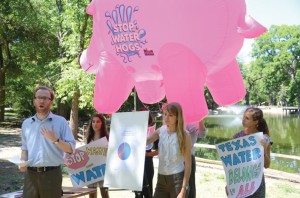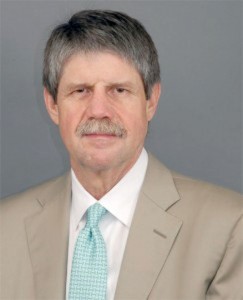As growth outpaces the water supply in Texas and drought conditions persist, some cities have taken serious steps to conserve water. But environmental leaders say that neither state agencies nor most cities have really gotten serious about promoting and mandating conservation. The dwindling supply and the reckless usage habits of most Texans are driving up the price of water, making it more appealing to prospectors.

Just last year, Fort Worth and Arlington seemed poised to enact serious water restrictions and then tabled those plans, causing critics to accuse them of failing to fix the roof while the sun is shining.
Arlington’s restrictions were abandoned after about 20 angry protesters showed up at a city council meeting and yelled the measure down, calling the restrictions un-American.
Arlington spokeswoman Rebecca Rodriguez said the council hasn’t abandoned the idea of future restrictions, but a few rainy days last year delayed action. “With the rain we’ve had recently, it’s looking considerably better,” she said.
The Fort Worth City Council likewise put off its proposed restrictions because the council needed “more information,” spokesperson Bill Begley said.
Luke Metzger, director of Environment Texas, said that if other cities can rein in their water problems, so can Fort Worth.
“Right now, Fort Worth has a per capita use of about 215 gallons of water per day, while the state water board recommends achieving an average of no more than 140 gallons,” he said. “San Antonio has been doing it [hitting the 140-gallons-per-day mark] for a long time, and Austin is on its way there.”
There are many ordinances and incentives that could be used to reduce water usage substantially, he said. “Fort Worth still doesn’t have a permanent lawn-watering standard. That has a huge impact — in the summer, city water use doubles, just for lawn watering, which is basically a luxury item.” Governments could also provide incentives to get customers to replace water-wasting appliances with more efficient ones. And irrigation audits could help farmers and industries track down leaks in their systems.
Those kinds of measures should be exhausted before the state provides funds for more reservoirs and pipelines that involve great expense and the threat of environmental damage, Metzger said.
Activists such as David Foster of Clean Water Action Texas believe that cities don’t have much more time to stall. He and others say that arid conditions in Texas can no longer be called a drought, but rather a new reality in a changing climate.
“The water shortage is real, and I think it’s here to stay,” he said. “I think what we call drought is the new norm.”

Environmental attorney Jim Blackburn of Houston said that state recommendations are easily ignored by cities because there is little or no enforcement to back them up.
“Nothing in the state water policy forces conservation,” he said.
The need for conservation is underscored by the significant cost of transporting water — costs that Texas will incur if it relies too heavily on pipelines that rob Peter so Paul can water his lawn.
“The experience in California where they use 30 percent of their energy just to get their water around in pipelines has shown that moving water is extraordinarily expensive,” Burgin said. “All the research points to really bad things for the future of water in Texas. There are plenty of cities in Texas that are actually talking about how many years [of water] they have left.”
One way to conserve water, Foster said, is for cities to ban non-native grasses such as St. Augustine.
“We have to stop keeping turf grasses alive that don’t belong in our climate,” he said. “So that’s where I’m hoping the gains in conservation can be made. I don’t think cities are going to have any choice other than to conserve. It’s not something you can build your way out of with pipelines.”
Blackburn said that the privatization of water and what he calls Texas’ “horribly inefficient” management system of surface water is a recipe for worst-case scenarios for the health of bays, estuaries, rivers, and municipal water supplies.
“If we don’t have conservation integrated into our system, we’re not going to survive it in any type of an economically efficient way,” he said. “And yet we continue to recruit businesses and people as if water is unlimited. I don’t think we’re being honest in the least about that.”
********
In Texas, groundwater is mostly unregulated by the state, although aquifers provide more than half of the water that Texans rely upon.
The “rule of capture” law says that if you own land, you also own the water that lies beneath it. Courts have ruled that, in practice, landowners have the right to extract water from under their neighbors’ land as well.
The only regulatory mechanisms that exist are local groundwater conservation districts, along with groundwater management areas that cover larger swaths of territory.
The conservation districts theoretically govern drilling permits and how much groundwater a landowner can use, but each district has its own set of rules. There are fewer than 100 districts out of 254 Texas counties. The oil and gas industry, however, is exempted from the permitting process.
Burgin is one of a chorus of activists who would like to see groundwater better regulated in Texas, so that commercial water sellers can’t take control of the state’s supply.
“If you don’t have some kind of agency setting limits, it’s pretty much open season on water,” she said. “It’s treated in the law exactly like air: You can have as much of the air above your property as you want, but how exactly can you tell where the air stops?”
She and others would like to see a statewide equivalent of a groundwater conservation district, but she doesn’t believe there is political will in the Texas Legislature to pass any kind of regulation. Lawmakers, she said, are just as scared of unpacking the laws on historical water rights as they are of farm and business interests.
Foster agreed that further regulation of groundwater would be unpopular and therefore unlikely, but he believes that the legislature must act before the state runs dry.
“I don’t think they can just leave it open as it is right now,” he said. “It’s the Wild West. On the other hand, I don’t know that they’ll put a complete stop to the transfer of groundwater to urban areas.”
Texas law differentiates between surface and groundwater. But Blackburn, who is also a professor at Rice University, said that they are all interconnected and believes that any new regulation should address the state’s entire water supply.
“Groundwater is essentially private property, and that undermines the regulation by groundwater districts,” he said. “A lot of the springs that provide the base flow for our rivers are going to be dried up.
“We need to reconsider all surface water rights,” he added. “The state basically took the water away from the agricultural interest and gave it to the municipal interest during times of drought. I’m not telling you I think that’s a bad thing, but it is an unprecedented thing.”
If they’re not likely to make major changes in water rights law, legislators this session do appear to be serious about funding water projects.
House Bill 4 and Senate Bill 4 both would provide about $2 billion to the Texas Water Development Board for water-related projects. The funds would be provided as loans to be repaid and put back into the Rainy Day Fund.
“That’s bad,” said Burnam, an environmentally conscious Democrat who thinks water shortages could be dealt with more effectively through conservation rather than spending more money on infrastructure. “It is a lot cheaper to do water conservation than to build more dams.”
To that end, he has filed a bill to charge fees to oil and gas companies that dispose of drilling wastes in commercial injection wells. The intent is to encourage them to recycle more of their waste fluids, rather than pumping millions of gallons of toxic wastewater into underground formations, where it is removed permanently — or so the drilling industry maintains — from the water cycle.
Both the House and Senate water development bills call for the Texas Water Development Board to consider conservation efforts when it considers projects — pipelines, desalination plants, and as many as 22 new reservoirs — for which local governments seek funding. Environmentalists want stronger measures than that.
“Both bills call for a certain percentage of money out of the fund to be earmarked for water conservation and water reuse projects,” said Ken Kramer, water resources chair of the Lone Star Chapter of the Sierra Club.
Metzger, of Environment Texas, recently urged Perry and other state leaders to set aside “at least half of any water funding for water conservation and reuse, repairs to leaking water mains, and to purchase water and development rights to keep water in our rivers for wildlife and recreation and to protect land that helps ensure good water quality.”
********
Kramer expects water issues to get a lot of legislative attention in the future.
“You’re going to see more and more emphasis on conservation in the coming years,” he said. “The drought has made an impression on a number of people.”
He said companies in Texas would like to put together enough water rights to get into the commercial groundwater business, but “nobody has a real active project under way.”
That’s due in part, he said, to the power of groundwater conservation districts to control the issuance of water-drilling permits. Many districts limit such permits to five years.
“A lot of marketers don’t want to invest in a long-term project” when they could lose their water rights after five years, Kramer said. “And cities that are potential buyers don’t want to hang their hats on a system that might not be re-authorized.”
If the Exelon Corp.’s bid for water from the already overcommitted Guadalupe River has been turned aside and the proposed coal-fired plant near Sweetwater is still being fought, other corporate pressures on Texas water supply continue.
A major corporate water sponge in East Texas has been Ozarka, the bottled water supplier owned by multinational conglomerate Nestlé Waters North America Inc., a $4.4 billion-a-year business that holds water rights all over the world.
In 1995, a group of about 200 farmers and landowners in Henderson County unsuccessfully sued the water giant over its depletion of Roher Spring, from which the water company was taking 90,000 gallons of groundwater a day. For the farmers and ranchers in the area, the spring is the sole source of their well water and feeds Mill Creek, which provides water for their livestock. The company still lists the spring as one of its sources.
Farther south, Nestlé has caused more controversy. In 2011 the company struck a deal to buy water from Pasadena in order to meet product demand in Southeast Texas and parts of Louisiana. The Houston suburb offered Nestlé a 50 percent discount on water services to lure the company to town. The plant it built there uses up to 9 million gallons of water a month.
Burgin said that Ozarka has run amok with Pasadena’s water, going so far as to back up its tanker trucks to fire plugs.
“The people of Pasadena didn’t know the city was selling their drinking water,” she said. “But that’s something that’s unfortunately part of how water utilities in this state operate. They sell as much water as they can. It’s actually a part of their budget. That really does pose a conflict of interest, with municipalities trying to retain water for their residents.”
Like other cities along the Houston Ship Channel, Pasadena was forced to switch to using surface water supplies to stop ground subsidence. Pasadena buys much of its drinking water from the city of Houston. In effect, Burgin said, Nestlé is buying Houston water, bottling it, and selling it back to Houstonians and others.
Blackburn believes that the real crime in the way Nestlé uses Pasadena’s water is that the city is buying more water than it can use.
“They got too much water and they are selling excess water, when frankly, it ought to be reallocated to those who need it rather than selling it for commercial gain,” he said.
Portions of this story were first published in an article by Shiney Varghese for the Institute for Agriculture and Trade Policy. Fort Worth Weekly editor Gayle Reaves also contributed to the story.












michaelpickens.blogspot.com
A fool and his resources are soon parted. Many people in this country believe that the earth is essentially just this huge grab bag that can be taken from an infinite amount of times with few, if any, negative effects. The underlying attitude of what’s good for me now is good for all, regardless of how it may affect others later, also contributes to the problem, as few are concerned with the greater good of society, especially over time (why that might be seen as socialism). As long as these views are held as mainstream, coupled with the often frivolous, but highly profitable, allocation of our natural resources by the multinationals and Wall Street, our legacy to future generations will be measured in scarcity and misery on a grand scale
Please cite your source: “Aquifers have been ruined downstream from injection wells into which the gas-drilling industry is shoving its toxic wastes. “